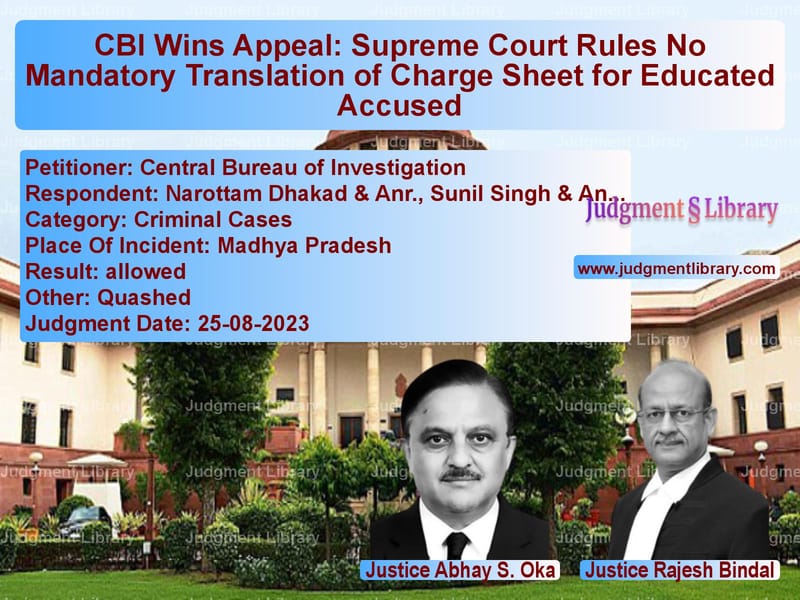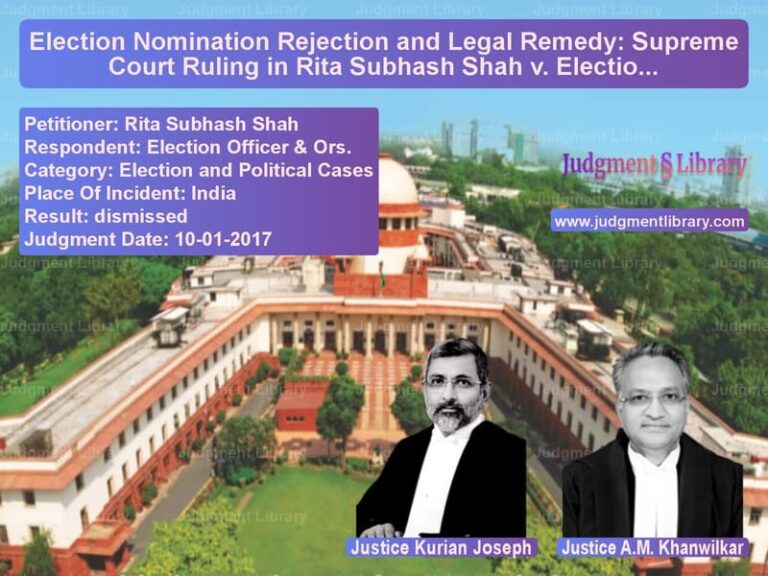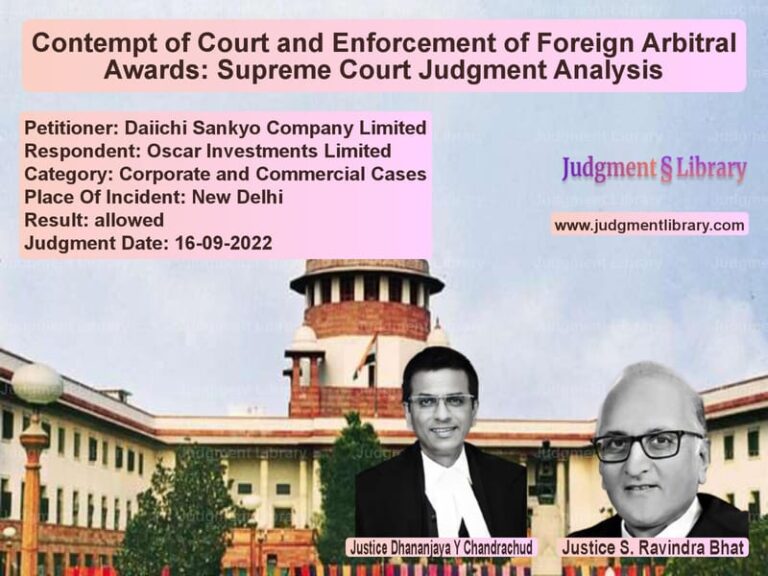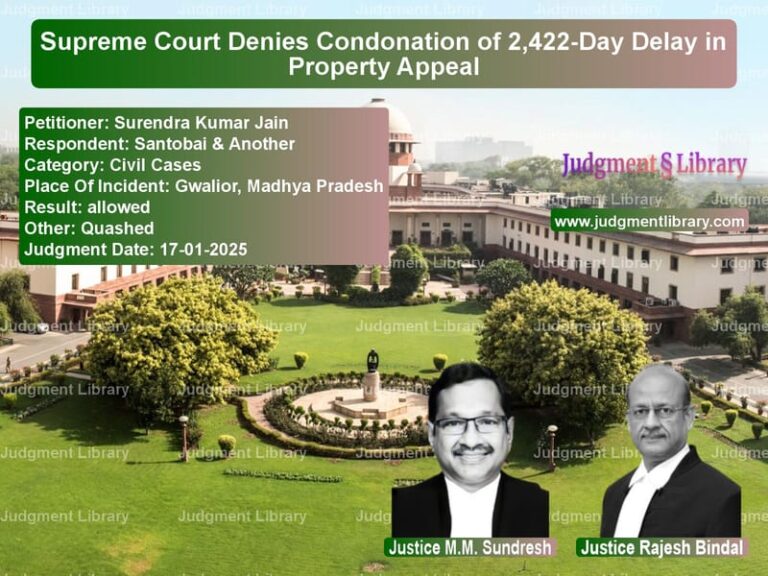CBI Wins Appeal: Supreme Court Rules No Mandatory Translation of Charge Sheet for Educated Accused
The Supreme Court of India recently ruled on a significant issue concerning the translation of charge sheets in criminal trials. The case, Central Bureau of Investigation v. Narottam Dhakad & Anr., along with Central Bureau of Investigation v. Sunil Singh & Anr., arose from the VYAPAM scam in Madhya Pradesh. The accused had requested a Hindi translation of their charge sheets, arguing that the original documents in English prevented them from effectively defending themselves. The Supreme Court overturned the High Court’s ruling that had favored the accused, setting a precedent for how charge sheets are handled in multilingual legal systems.
Background of the Case
The case involved the Central Bureau of Investigation (CBI), which had filed charge sheets against multiple accused in relation to the infamous VYAPAM scam. The charge sheets were filed in English. The accused—Narottam Dhakad and Sunil Singh—argued that they were unable to understand the documents and demanded a Hindi translation.
The legal journey of the case was as follows:
- The Trial Court: Rejected the accused’s request, noting that they were well-educated and had legal representation that understood English.
- The Sessions Court: Upheld the Trial Court’s decision.
- The Madhya Pradesh High Court: Overturned the lower court rulings, holding that since Hindi was the official language of criminal courts in the state, the accused had a right to a Hindi translation.
- The Supreme Court: Set aside the High Court’s order, ruling that the accused were not prejudiced by the English charge sheet and that translations are not automatically required.
Key Legal Issues Considered
The Supreme Court examined the following legal questions:
- Does an accused have an absolute right to a translated charge sheet in the official language of the trial court?
- Does filing a charge sheet in English violate the rights of an accused under the Code of Criminal Procedure (CrPC)?
- When can a translation be required to ensure a fair trial?
Arguments by the CBI
The CBI contended:
- The accused were well-educated and capable of understanding English.
- The charge sheets were voluminous, and translating them would be time-consuming and expensive.
- The accused had legal representation that understood English, ensuring no prejudice.
- The CrPC does not mandate that charge sheets must be in the official language of the state.
Arguments by the Respondents
The accused, Narottam Dhakad and Sunil Singh, argued:
- The Madhya Pradesh government had declared Hindi as the official language of criminal courts under Section 272 of the CrPC.
- Without a Hindi translation, they could not properly defend themselves.
- The right to a fair trial includes access to documents in a language they understand.
Supreme Court’s Analysis and Judgment
1. No Automatic Right to Translation
The Supreme Court ruled that translations are not required in every case:
“There is no provision in CrPC that makes it obligatory for the investigating agency to file charge sheets in the language of the court.”
2. The Role of Section 272 of the CrPC
The Court clarified that Section 272, which allows state governments to determine the language of courts, applies to court proceedings, not police investigations:
“The power under Section 272 is not a power to decide which language shall be used by the investigating agencies for maintaining investigation records.”
3. Fair Trial and Understanding the Charge Sheet
The Court acknowledged that an accused must understand the charges but found no violation in this case:
“The accused were educated and had legal representation conversant in English. There is no failure of justice in denying them a translated charge sheet.”
4. Practical Considerations of Translation
The Court emphasized that translating voluminous charge sheets would be burdensome and should be done only when absolutely necessary:
“With the availability of translation software and artificial intelligence tools, providing translations is not difficult. However, the necessity must be evaluated on a case-to-case basis.”
Supreme Court’s Final Decision
The Court ruled in favor of the CBI and set aside the High Court’s decision. It directed the lower courts to proceed with the trial without requiring a Hindi translation.
“Hence, the appeals succeed, and the impugned orders are set aside. The trial court shall expeditiously proceed with the trial.”
Conclusion
This ruling establishes several key principles:
- No automatic right to translation: Charge sheets do not need to be in the official language of the court unless the accused demonstrates an inability to understand them.
- Fair trial considerations: Translations may be required if an accused cannot understand the language and does not have competent legal assistance.
- Language of police investigations: Investigating agencies are not bound by the official language rules applicable to courts.
- Practicality of translations: Courts must balance fairness with logistical challenges in translating large documents.
The ruling ensures that procedural demands do not unduly burden law enforcement while safeguarding an accused’s right to a fair trial.
Petitioner Name: Central Bureau of Investigation.Respondent Name: Narottam Dhakad & Anr., Sunil Singh & Anr..Judgment By: Justice Abhay S. Oka, Justice Rajesh Bindal.Place Of Incident: Madhya Pradesh.Judgment Date: 25-08-2023.
Don’t miss out on the full details! Download the complete judgment in PDF format below and gain valuable insights instantly!
Download Judgment: central-bureau-of-in-vs-narottam-dhakad-&-an-supreme-court-of-india-judgment-dated-25-08-2023.pdf
Directly Download Judgment: Directly download this Judgment
See all petitions in Fraud and Forgery
See all petitions in Judgment by Abhay S. Oka
See all petitions in Judgment by Rajesh Bindal
See all petitions in allowed
See all petitions in Quashed
See all petitions in supreme court of India judgments August 2023
See all petitions in 2023 judgments
See all posts in Criminal Cases Category
See all allowed petitions in Criminal Cases Category
See all Dismissed petitions in Criminal Cases Category
See all partially allowed petitions in Criminal Cases Category







